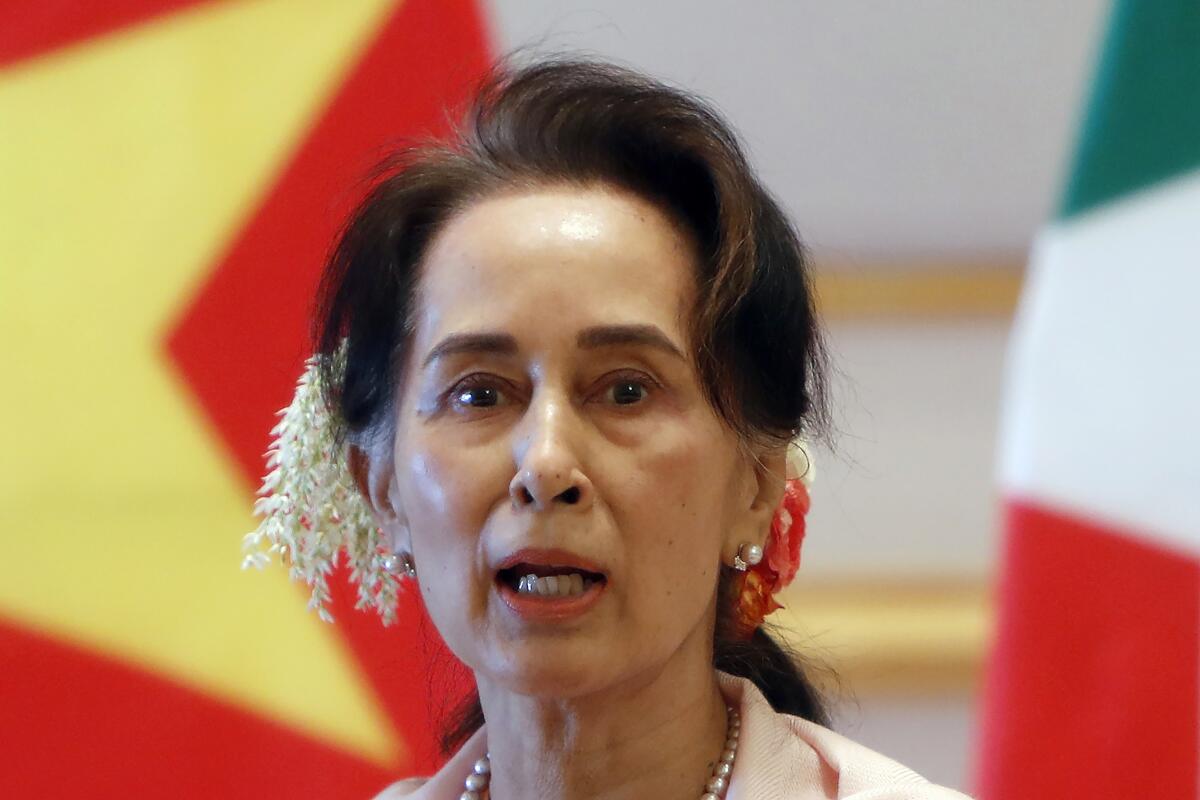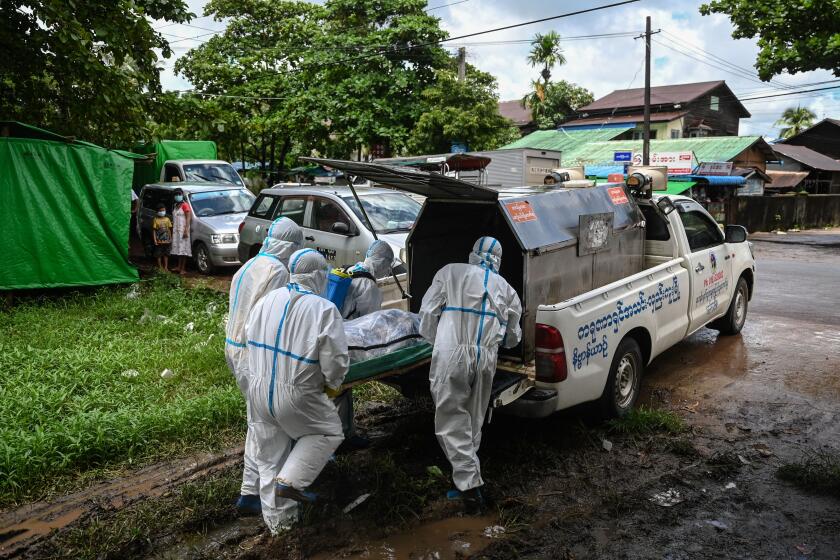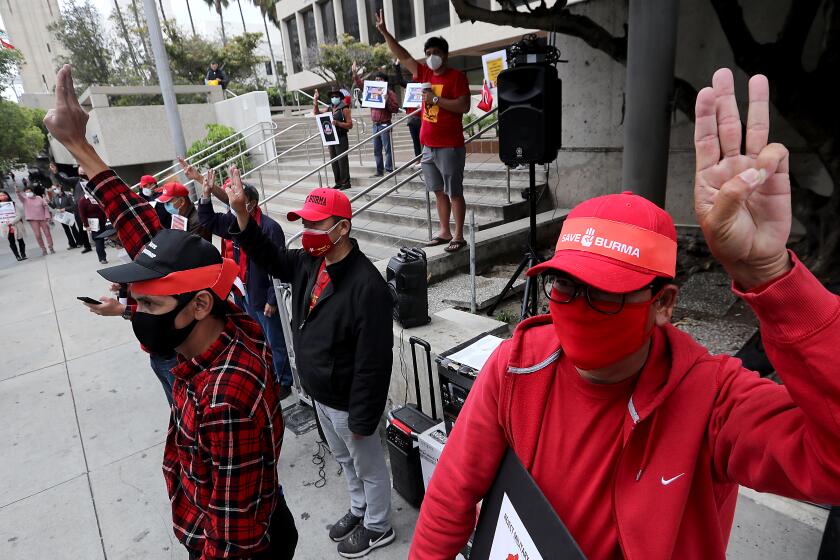Sentenced to 2 years, Aung San Suu Kyi still faces a host of other charges

- Share via
The four-year prison sentence — reduced later in the day to two years of house arrest — given to ousted Myanmar leader Aung San Suu Kyi on Monday on charges of incitement and failing to observe pandemic restrictions is one small shot in a legal offensive intended to deal her and her National League for Democracy a crippling political blow.
Suu Kyi’s supporters and legal experts generally believe the cases against her have been contrived to discredit her and justify the military’s seizure of power in February.
Suu Kyi and her co-defendants have been charged under a wide range of laws and have pleaded not guilty to every charge.
Telecommunications law
Suu Kyi is charged with having walkie-talkies that were operated by her security guards without a license. Maximum penalty is one year in prison and a fine. Verdict expected Dec. 13.
Export-import law
Suu Kyi is charged with improperly importing the walkie-talkies. It was the first charge filed after her house was raided when the military seized power Feb. 1, and was used to detain her at the beginning of her incarceration. Maximum penalty is three years’ imprisonment and a fine. Verdict expected Dec. 13.
Coronavirus restrictions
Suu Kyi is charged with two counts of violating coronavirus restrictions during campaigning for last year’s election, which her party won overwhelmingly and the military refuses to recognize. The offense falls under the Natural Disaster Management Law. Ousted President Win Myint also is charged under the law. Maximum penalty for each count is three years in prison and a fine. She was found guilty on one count Monday and sentenced to two years in prison. A verdict on the second count is expected Dec. 14.
Record numbers are dying as Myanmar’s healthcare system all but collapses. Virus-stricken households in Yangon fly flags to plead for medicine, food.
Incitement
Suu Kyi was also found guilty on Monday of incitement, defined as spreading false or inflammatory information that could disturb public order, and sometimes referred to as sedition. Her co-defendants on the incitement charge were Win Myint and Myo Aung, the former mayor of the capital, Naypyitaw. They were also found guilty. Maximum penalty is two years in prison and a fine. All three received the maximum sentence of two years.
Official Secrets Law
The Official Secrets Law, also known as the State Secrets Law, is a legacy of the British colonial era that criminalizes the possession, collection, recording, publishing or sharing of state information that is “directly or indirectly, useful to an enemy.” Suu Kyi’s co-defendants in the case are three former members of her Cabinet and Sean Turnell, an Australian economist who served as her advisor. The details of the alleged offense have not been made public, though state television has said Turnell had access to “secret state financial information” and tried to flee the country. Maximum penalty is 14 years in prison. Verdict expected next year.
Anti-corruption law
A special court is hearing four corruption cases against Suu Kyi. She faces two charges covering her own actions, and two in which she allegedly conspired with other defendants to carry out corruption, which involves abuse of authority. Testimony included an allegation by a former political ally of Suu Kyi’s, who said he handed her a bribe of $600,000 and seven gold bars in 2017-18. Suu Kyi dismissed his allegations as “absurd.”
Suu Kyi has also been charged with diverting money meant as charitable donations to build a residence, and misusing her position to obtain rental properties at lower-than-market prices for a charitable foundation named after her mother that she chaired. The Anti-Corruption Commission has alleged that such actions deprived the state of revenue it would otherwise have earned.
Burmese in the U.S. are protesting the brutal crackdown and urging global intervention. But it’s hard to overcome a lack of knowledge and interest.
Maximum penalty for each offense is 15 years in prison and a fine. No date is set yet for the verdict.
A fifth corruption charge, also involving the rental of real estate, has not yet gone to trial. The authorities announced last week they have filed a sixth charge against Suu Kyi and Win Myint in connection with granting permits to rent and buy a helicopter.
Election-related laws
Myanmar’s election commission announced that it was prosecuting Suu Kyi and 15 other political figures for alleged fraud in the November 2020 general election. The action by the Union Election Commission could result in Suu Kyi’s National League for Democracy party being dissolved and unable to participate in a new election that the military has promised will take place within two years of its takeover.
The commission said Suu Kyi, Win Myint, other leading figures from her party and the commission’s own former chairman were “involved in electoral processes, election fraud and lawless actions” related to the polls. An election commissioner announced that Suu Kyi and two colleagues were accused of violating the constitution and several election laws.
More to Read
Sign up for Essential California
The most important California stories and recommendations in your inbox every morning.
You may occasionally receive promotional content from the Los Angeles Times.











